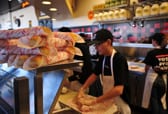 You run a foodservice business – one that is part of a national franchise network whose brand is built on the promise of clean, fresh, tasty food made to-order. Some of your employees decide to begin an organizing effort, in part to protest the lack of paid sick days currently provided to them.
You run a foodservice business – one that is part of a national franchise network whose brand is built on the promise of clean, fresh, tasty food made to-order. Some of your employees decide to begin an organizing effort, in part to protest the lack of paid sick days currently provided to them.
And, as part of that effort, they put up posters implying that maybe, just maybe, the food your business sells to customers could be made by someone who is sick. In fact, the posters even appear inside your restaurant, on a community bulletin board.
Makes you want to fire them, doesn’t it?
Well, if you did – you’d be breaking the law, according to an August 21st ruling by the National Labor Relations Board that forced a Minnesota Jimmy John’s franchisee to rehire the employees he did fire, and potentially face other legal sanctions as well.
The franchising industry often attracts people with accumulated capital and a palpable commitment to building a high-growth business, which is in part why the model is so successful. On the other hand, often times the entrepreneurs who become new franchisees may have had little to no prior experience managing an hourly workforce, and chances are they have no idea how unionization or any other aspect of labor relations works.
Once you begin hiring and managing hourly employees for your business, those employees are protected by the Fair Labor Standards Act (FLSA) and the National Labor Relations Act (NLRA). Many employers think that the latter law only impacts them if employees choose to unionize, or even once a union is voted in. That is not the case. Even non-union employees are protected by provisions of the NLRA.
Your employees have rights as well as responsibilities
If you’re a first-time franchise owner and you’ve never encountered the complexities of American labor law head-on before, just keep in mind that while your business is your business, your employees are not entirely your employees. They have rights and protections afforded to them for good reason, but those protections may at times seem strangely at odds with what you think is clearly in the best interests of the business.
In the Jimmy John’s case, the franchise owner made a clear and compelling argument that the posters his protesting employees distributed (there were, by some accounts, more than 3,000 posters in all) were defamatory and malicious in their intent. In fact, he said that the posters actually threatened the livelihoods of all of the other employees whose jobs would be lost if the business failed due to a false perception of food safety danger created by the posters, in the eyes of the buying public.
It certainly makes sense on the one hand, and chances are no business owner would consider the posters tame or ‘okay’. But the National Labor Relations Board (NLRB) looks at things from the context of the “concerted activity” involved, and asks how the activities of the employees do or do not accord with that intent under the law.
In this case, the NLRB decided that the core statement on the posters (i.e. that employees at the restaurant did not receive paid sick time) was “factually accurate”, and that the actions of the employees demonstrated that they were “motivated by a sincere desire to improve their terms and conditions of employment”.
The Board also found fault with the franchisee because one of his supervisors encouraged some employees to disparage a fellow worker who was pro-union on Facebook.
What does this mean for your business?
Quite simply, it means this: When your employees request, press or demand changes to their labor conditions and they join together to represent themselves or appoint a representative in an organized fashion, you need to know the law and follow it carefully.
The NLRB calls this Protected Concerted Activity, and specifies that “The law we enforce gives employees the right to act together to try to improve their pay and working conditions, with or without a union. If employees are fired, suspended, or otherwise penalized for taking part in protected group activity, the National Labor Relations Board will fight to restore what was unlawfully taken away.”
What the Jimmy Johns case proves is that the NLRB is fully committed to protecting every employee’s right to concerted activity, and that such activity is protected by a very wide berth.
Managing employees is complicated enough when everyone is generally happy and the morale of your workforce is genuinely positive. But when things begin to get the least bit complicated, many business owners are completely unprepared.
If you’re new to the world of managing an hourly workforce or if your business is beginning to experience changes that could complicate the nature of your employee-management relationships, take the smart step and proactively seek professional assistance – like working with a dedicated, professional human resources consultant who can review and advise on your policies, procedures, benefits and other aspects of your work culture.
Want to learn more about the National Labor Relations Act? You can, by visiting the official website here:
National Labor Relations Act
http://www.nlrb.gov/resources/national-labor-relations-act
For more information on how your business can maintain an effective employment environment in the midst of ever-more-complex federal, state and local laws, contact HR Resolutions today for a free initial consultation to discuss how on-site, on-call and as-needed HR outsourcing can work cost-effectively in your business, or call us at 717-652-5187.
Article Sources:
NLRB judge finds Jimmy Johns franchisee in Minnesota illegally fired employees for protected activity
http://www.nlrb.gov/news-outreach/news-story/nlrb-judge-finds-jimmy-johns-franchisee-minnesota-illegally-fired-employees
NLRB: Jimmy John’s Can’t Fire Workers for Icky Sick-Leave Protest
http://www.businessweek.com/articles/2014-08-25/nlrb-jimmy-johns-cant-fire-workers-for-icky-sick-leave-protest
MN Jimmy John’s Workers Call Foul; Owner Refutes
http://tcbmag.blogs.com/daily_developments/2011/03/mn-jimmy-johns-workers-call-foul-owner-refutes.html
Rights We Protect: Protected Concerted Activity [NLRB]
http://www.nlrb.gov/rights-we-protect/protected-concerted-activity
Image Credit: nateone (Flickr @ Creative Commons)

